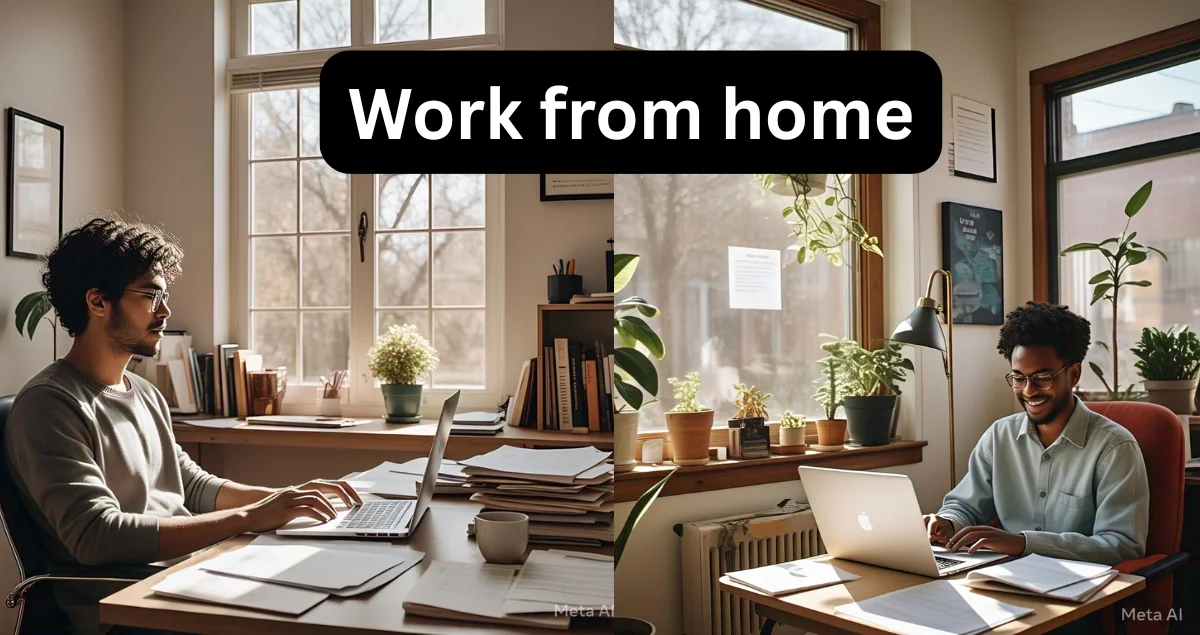Introduction to Remote Work and Mental Health
In this digital age, working from home, the psychology of work, and how to manage your time at home have become important issues for both businesses and employees. The pandemic sped up the trend of working from home, which changed how people interact in typical offices. This change gives us more freedom and flexibility, but it also makes us rethink how we think about work, time, and mental health.
Our brains typically have a hard time switching between work mode and rest mode when we’re not in an office setting. This article talks about the psychology of working from home, how the lines between job and personal life can get blurred, and how to stay disciplined and balanced in your life.
Understanding the Psychology of Work
Work psychology looks at what makes people stay focused, motivated, and productive at work. Our work mindset is shaped by our daily lives, the places we go, and the people we talk to.
What Drives Productivity and Focus
Motivation: In the workplace, structured surroundings, goals, and how coworkers interact with each other usually provide motivation.
Routine Reinforcement: Doing things over and over again and knowing when they will happen helps you develop good work habits.
Feedback Loops: In-office environments provide us feedback right away, which keeps us interested. People who work from home have to make their own loops.
Psychological Contracts in Work Culture
We unconsciously set expectations for our jobs, responsibilities, and limits. At home, these “contracts” need to be changed. When there is no management or peer pressure, internal rules need to be stricter.
The Blurred Boundaries Between Home and Office
One of the most shocking things about working from home is that there are no longer any physical limitations. Your mind never really “clocks out” when your eating table is also your desk.
How Environment Shapes Behavior
It’s tougher to turn off mentally when you don’t have to go to work or school. This mental fog makes people burn out and be less productive.
How the environment affects behavior and how physical space affects work efficiency
Setting aside a workstation, even a little one, tells your brain that it’s time to get to work. Environmental psychology shows that environments that are well-lit and devoid of clutter help people pay attention and don’t overload their brains.
Why It’s Important to Have a Dedicated Workspace
Makes everything more organized and separates people mentally.
Promotes intentionality and the establishment of habits.
Discipline and time management
Self-Regulation Theory and Work
Setting objectives, keeping an eye on behavior, and fixing mistakes are all things that help us be self-disciplined. If you don’t have someone else to impose rules, your own discipline is your best instrument.
Time Management and Internal Discipline
Why It’s Important to Have a Dedicated Workspace
Makes everything more organized and separates people mentally.
Promotes intentionality and the establishment of habits.
Discipline and time management
Self-Regulation Theory and Work
Setting objectives, keeping an eye on behavior, and fixing mistakes are all things that help us be self-disciplined. If you don’t have someone else to impose rules, your own discipline is your best instrument.
How to Stop Putting Things Off at Home
Take little measures to finish tasks.
Use the techniques of timeboxing and habit stacking.
Recognize “task aversion” and deal with it in a conscious way.
Problems with work-life balance
Work-Life Balance Challenges
Emotional Spillover and Too Much Thinking
Work stress that isn’t dealt with might easily spill over into personal time. On the other hand, family distractions might get in the way of deep work.
Ways to Handle Boundaries
Set clear work hours and let everyone know about them.
End the workday with a shutdown ritual.
Don’t let devices into your bedrooms or places where you relax.
Working from home has its perks, such being able to choose your own hours.
No commute means more time with family.
You can change the environment to make it more comfortable.
Benefits of Working from Home
Not being able to talk to people in person.
Blurring the lines between work and personal life.
Risk of working too much without breaks.
Tips for making a routine and sticking to it in your mind
Make habits that will help you stay on track, like getting dressed for work.
Use calendars and post-its as visual cues.
Keep the same times for waking up and going to bed.
Case Studies and Behavioral Insights
Remote workers who set up a systematic morning routine and implemented digital time-blocking said they were 33% more productive. People who didn’t make a clear distinction between work and play said they were more stressed and emotionally drained.

Business Consultant | Web designer & Developer | Social media Manager | SEO | Passionate Learner, I am deeply passionate about learning and continuously improving my skills.
My interests are diverse, ranging from music and singing to computers and programming languages, digital art, AI




